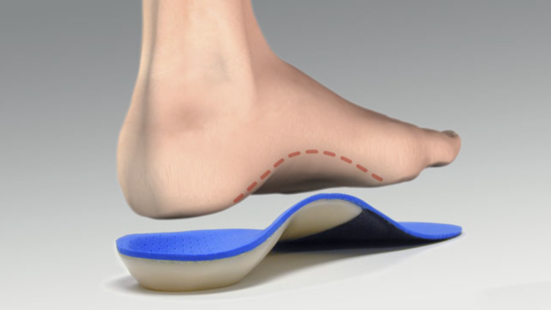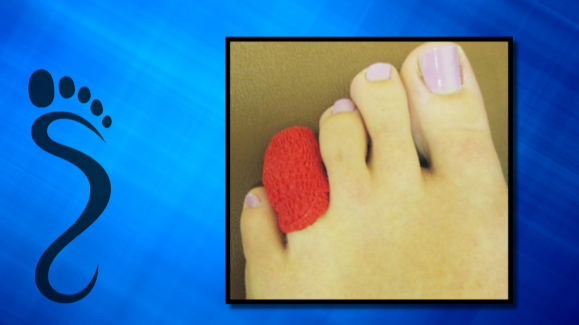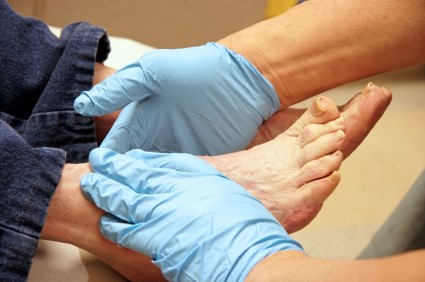Items filtered by date: January 2015
When Dealing with Plantar Fasciitis, Try Orthotics
 Plantar fasciitis is a painful condition that causes tendons in the feet to become inflamed. Foot orthotics are an effective way to mitigate the pain from this condition because it lowers the amount of pressure placed on one’s heel and diffuses the impact of one’s feet with the ground when walking.
Plantar fasciitis is a painful condition that causes tendons in the feet to become inflamed. Foot orthotics are an effective way to mitigate the pain from this condition because it lowers the amount of pressure placed on one’s heel and diffuses the impact of one’s feet with the ground when walking.
In addition, orthotics prevents irregularities in one’s biomechanics, which makes one less likely to get plantar fasciitis in the first place. Foot deformities and conditions can often be fixed through the use of custom orthotics, but it may be prudent to check with a medical professional before buying one.
Foot orthotics is useful for treating a myriad of conditions, including heel injuries like plantar fasciitis. If you are dealing with foot pain and are interested in the possibility of using orthotics as a treatment, call podiatrist Dr. Joshua David Scoll of Pennsylvania. Dr. Scoll can evaluate the severity of your condition and determine what type of care would best suit your needs.
What is Ankle Foot Orthotics?
Orthotics is physical aids used to support weak limbs or direct the proper function of limbs. Often they are used to support the ankle and foot. Such orthotics is known as AFOs. AFOs help strengthen the muscles or train them to function in the proper position. AFOs can also benefit muscles that need to be lengthened or loosened.
Why might you need orthotics?
Orthotics is often prescribed when someone is suffering from diseases that affect the musculature, like polio and multiple sclerosis. However, more common conditions like arthritis and stroke, or those that “toe in”, may also require orthotics.
Modern orthotics has improved dramatically from the metal braces of previous years. Many of today’s orthotics is made of lightweight plastics and other advanced materials to provide new levels of comfort and support. Often the orthosis is designed in a rigid L shape that is contoured to the calf and flesh colored.
For more information about Ankle Foot Orthotics, please follow the link below.
If you have any questions, please contact one of our offices located in Bensalem and Philadelphia, PA. We offer the newest diagnostic and treatment technologies for all your foot care needs.
Read more about Foot Ankle Orthotics
Thunder God Vine Can Aid Patients with Rheumatoid Arthritis
 A recent study published in the journal Annals of the Rheumatic Diseases recently found that a Chinese herb known as thunder god vine may be an effective treatment for Rheumatoid Arthritis. The study used 207 patients and observed their responses to the herb, the pharmaceutical drug methotrexate, and a combination of both.
A recent study published in the journal Annals of the Rheumatic Diseases recently found that a Chinese herb known as thunder god vine may be an effective treatment for Rheumatoid Arthritis. The study used 207 patients and observed their responses to the herb, the pharmaceutical drug methotrexate, and a combination of both.
After six months, the groups were assessed to see which achieved close to a fifty percent improvement in their pain and joint stiffness. Forty-six percent of the patients prescribed methotrexate noticed an improvement. This was lower than the fifty-five percent of participants given just the herb, and seventy-seven percent of those treated with both medications.
Characterized by stiffness and lack of mobility, Rheumatoid Arthritis is a painful condition that needs medical attention. For treatment options, see podiatrist Dr. Joshua David Scoll of Pennsylvania. Dr. Scoll can take care of any foot conditions and determine a treatment plan that is right for you.
What Is Rheumatoid Arthritis?
Rheumatoid Arthritis (RA) is an autoimmune disorder in which the body’s own immune system attacks the membranes surrounding the joints. Inflammation of the lining and eventually the destruction of the joint’s cartilage and bone occur, causing severe pain and immobility.
Rheumatoid Arthritis of the Feet
Although RA usually attacks multiple bones and joints throughout the entire body, almost 90 percent of cases result in pain in the foot or ankle area.
Symptoms
- Swelling & pain in the feet
- Stiffness in the feet
- Pain on the ball or sole of feet
- Joint shift and deformation
Diagnosis
Quick diagnosis of RA in the feet is important so that the podiatrist can treat the area effectively. Your doctor will ask you about your medical history, occupation, and lifestyle to determine the origin of the condition. Rheumatoid Factor tests help to determine if someone is affected by the disease.
For more information about rheumatoid arthritis please follow the link below.
If you have any questions, please contact our offices located in Philadelphia and Bensalem, PA. We offer the newest diagnostic and treatment technologies for all your foot and ankle injuries.
Read more on Rheumatoid Arthritis
Dealing with Ingrown Toenails
 Margaret Abbott, a general practitioner (GP) at the Windmill Practice in Sneinton and the GP lead at NHS Nottingham City Clinical Commissioning Group, discusses methods to easing the pain of ingrown toenails. Ingrown toenails occur when the sides of the toenail grow into the surrounding skin, piercing the skin and causing it to become swollen and tender. Soaking the foot in warm water a couple of times a day should help clear the infection by loosening the skin and forcing the infection to grow out. Olive oil can be used to gently push the skin away while further softening the skin. Home remedies such as tea tree oil or a vapor rub can also be used, while an anti-inflammatory painkiller such as ibuprofen will ease the pain and reduce the inflammation.
Margaret Abbott, a general practitioner (GP) at the Windmill Practice in Sneinton and the GP lead at NHS Nottingham City Clinical Commissioning Group, discusses methods to easing the pain of ingrown toenails. Ingrown toenails occur when the sides of the toenail grow into the surrounding skin, piercing the skin and causing it to become swollen and tender. Soaking the foot in warm water a couple of times a day should help clear the infection by loosening the skin and forcing the infection to grow out. Olive oil can be used to gently push the skin away while further softening the skin. Home remedies such as tea tree oil or a vapor rub can also be used, while an anti-inflammatory painkiller such as ibuprofen will ease the pain and reduce the inflammation.
Ingrown toenails can become quite painful, especially if they are left untreated. If you are suffering from a painful ingrown toenail and are seeking treatment, consult with podiatrist Dr. Joshua David Scoll of Pennsylvania. Dr. Scoll will confirm your diagnosis and provide you with quality treatment.
Ingrown Toenails Causes
Ingrown toenails occur when a toenail grows sideways into the bed of the nail, causing pain, swelling, and possibly infection.
There are a number of risk factors for ingrown toenails. Some include cutting your nails too short, participating in strenuous sports, diabetes, obesity, and fungal infection. Some are genetically predisposed to ingrown nails, although wearing ill-fitting or damp shoes can exacerbate the problem.
Treatment
There are a number of steps you can take to treat ingrown nails:
-Let your toenails grow out
-Soak the toes in hot water with antibiotic soap or Epsom salts
-Placing a piece of cotton under the affected nail may allow the toe to grow up instead of into the nail bed
-Rest with your feet up
If however, your pain is severe, or you see red streaks running up your leg, you should see a podiatrist. Your podiatrist may make a small incision and remove part of the toe nail to relieve the pressure. A local anesthetic may be used to lessen the discomfort of the operation. Topical medication may also be prescribed to prevent the regrowth of the problem nail.
If you have any questions, please contact one of our offices located in Philadelphia and Bensalem, PA. We offer the newest diagnostic and treatment technologies for all your foot care needs.
Read more about Ingrown Toenails
Study Finds Shorter Nonsurgical Medical Treatment For Diabetics is More Effective
 A study conducted by the Gustave Dron Hospital in France suggests that a shorter period of antibiotic treatment may be more effective in patients with diabetic foot osteomyelitis than other forms of treatment. The study was conducted using 40 patients that were given oral antibiotics for the disease between 2007 and 2009 from five French hospitals. According to the Infectious Diseases Society of America guidelines, diabetic foot osteomyelitis should be resolved within three months of antibiotic therapy. However, the study showed nearly two-thirds of the patients had achieved remission in about six to twelve weeks of treatment. This proves that a shorter time span of treatment and nonsurgical treatment are acceptable methods for certain patients with osteomyelitis.
A study conducted by the Gustave Dron Hospital in France suggests that a shorter period of antibiotic treatment may be more effective in patients with diabetic foot osteomyelitis than other forms of treatment. The study was conducted using 40 patients that were given oral antibiotics for the disease between 2007 and 2009 from five French hospitals. According to the Infectious Diseases Society of America guidelines, diabetic foot osteomyelitis should be resolved within three months of antibiotic therapy. However, the study showed nearly two-thirds of the patients had achieved remission in about six to twelve weeks of treatment. This proves that a shorter time span of treatment and nonsurgical treatment are acceptable methods for certain patients with osteomyelitis.
Diabetes is a very serious condition that can result in many complications if left untreated. If you are diabetic and have any concerns, visit Dr. Joshua David Scoll of Pennsylvania. Dr. Scoll can treat your diabetic feet.
Diabetic Foot Care
Diabetes affects millions of people of all ages each year. Diabetes damages blood vessels in many parts of the body, including the feet. When damage occurs to nerves in the feet, they may be unable to send the proper signals to the peripheral nervous system, resulting in a condition known as neuropathy. Once a diabetic patient develops neuropathy, it is imperative that the feet are well taken care of to avoid possible amputation of the feet.
The Importance of Caring for Your Feet
- Regularly check your feet for bruises or sores.
- Wear socks that fit your feet; socks shouldn’t be tight.
- Wear properly fitting shoes that are comfortable.
Patients with diabetes should have their doctor monitor their Hemoglobin A1C levels as this test lets the physician know how well the blood sugar levels have been controlled during the past 3 months. It is important to keep the blood sugar levels in a normal range (70-110mg/dl). It is advisable to visit a podiatrist if the diabetic patient is experiencing any conditions involving the feet.
For more information about Diabetic Foot Care, follow the link below.
If you have any questions feel free to contact one of our offices located in in Philadelphia and Bensalem, PA. We offer the latest in diagnostic and treatment technology to meet your needs.
Read more about Diabetic Foot Care
